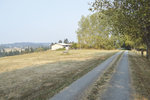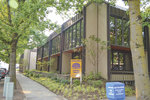

RIDGEFIELD - A little more than 10 years ago, some Clark County residents in the Orchards area had finally had enough.
They gathered their voices and confronted officials to complain about an abandoned property near their homes that had gathered junk and become overgrown.
“This half a block was just a vacant field with high density housing on one side and homes on the other,” County Councilor Tom Mielke recalled. “This thing was not maintained. People were parking old cars out there; it was messy.”
In response, the county government dispatched code enforcement on a mission to find the landowner and deliver a stern message to whoever would allow their property to stagnate into such a filthy eyesore.
After a bit of research, they found the property actually belonged to the county itself.
Aside from courthouses, garages and other usable structures, most of the property Clark County owns is marked for some specific future purpose, like a storm water facility. The county also owns a number of “scraps” around the area; things like odd corners or small strips between private property and a roadway which no one has an interest in purchasing.
Sometimes, larger parcels and even residential properties may fall into the county’s hands. The empty lot in Orchards was purchased decades ago as right-of-way for a road project. After the project was canceled, the plot of land was abandoned and eventually forgotten.
Law compels county governments to review properties they own and try to put those properties to their “best uses,” Mielke said, but he believes Clark County’s mechanism for reviewing its owned property is flawed and, with fellow Councilor David Madore, has pushed for staff to seek out other derelict land. If a plot is found to have no use to the county, it can be deemed “surplus property” by the council and eventually sold off to private landowners.
“Every piece of property that we do not put on the tax rolls means neighboring people in that area have to make up the difference,” Mielke said, “So our goal is to put it back into private use, put it back on the tax rolls, and hopefully help lower the cost to the landowners in the county.”
Several properties are being examined as potential surplus, officials said, but two are already working their way through the process to be deemed surplus and sold. One, the Dalle building, is a 3-story office building in downtown Vancouver that used to house Clark County offices, but is now mostly rented out to tenants. The other is a 20-acre farm with a farmhouse near the banks of the East Fork Lewis River.
The sale of the Dalle building could net up to $3.5 million the county could use to pay down debt or to cover one-time projects, Councilor David Madore said.
The farm would be a more complicated sale. It was purchased with state grant money intended for the preservation of sensitive habitats and to provide outdoor recreation. The idea was to sell the farm house on 5 acres and turn the remaining 15 acres into park land, but a change in zoning laws meant the entire plot must be kept whole. A stipulation in the grant prevents Clark County from selling the property without reinvesting the money into a project that satisfies the grant’s purpose of habitat preservation and recreation.
“If we want to sell that, we have to find a replacement property basically to use those funds for,” Peter Silliman, a Clark County policy analyst explained.
But not everyone agrees that the farm should be sold. Madore and Mielke pointed out the agricultural plot is not a natural habitat and said the location is too far from the river for access to the water for recreation, but Councilor Jeanne Stewart argued other public land surrounding the farm could be incorporated into a larger plan.
“It’s an enormous overlook for the river and the valley. It has park land on one side, and it has some publicly owned property to the north of it, just bordering on the river,” Stewart said Friday. “So I’m aware that the 20-acre parcel is not a parcel adjoining the south side of the river. There is another slip of property, but that property is also publicly owned … It’s land that could be accessible and incorporated into a broader kind of regional park facility.”
The process is progressing slowly as the options are being considered. Stewart encouraged residents to attend county council meetings to voice their opinions about the matter.
“If this was a worthless parcel, it wouldn’t matter,” Stewart said. “But as part of a more comprehensive plan, this could be a key parcel. Then it would be a shame to see it go. Once we cannibalize these parcels, we can never go back.”